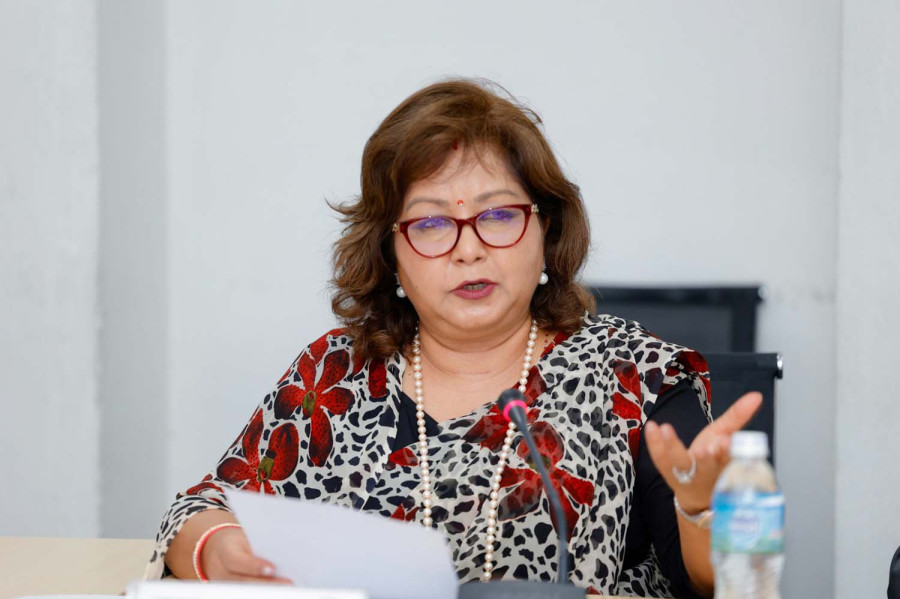National
Foreign Minister Deuba warns of aid decline amid global tensions
Speaking at a parliamentary committee Friday, she called for recalibrating development diplomacy and raised alarm over the plight of Nepali women in Gulf countries.
Post Report
Foreign Minister Arzu Rana Deuba has said that the current geopolitical landscape is highly fluid and unpredictable. Speaking at a meeting of the parliament’s International Relations and Tourism Committee on Friday, she expressed concerns over the latest global developments.
“Geopolitics is very fluid right now. We cannot predict what might unfold between Iran and Israel. There are Nepalis there as well. We have our embassies, and ambassadors there [in the Middle East],” said Minister Deuba. She added that the government is working to respond swiftly and remain prepared amid such uncertainty.
She also expressed concern that Nepal may receive less foreign development aid due to shifting geopolitical priorities. “Discussions are ongoing globally on how to deal with such a situation.”
“We must be careful in conducting our diplomacy while seeking economic assistance. Given the rapidly changing international politics, we need to rethink our approach to development diplomacy. The modalities of economic assistance are likely to change, so we have to be careful,” she said.
The parliamentary committee had asked Minister Deuba to brief it on recent and upcoming foreign visits, and on efforts to boost Nepal’s diplomatic presence globally.
The foreign minister stated that the Ministry of Foreign Affairs has increased diplomatic engagement, and expressed hopes about positive outcomes.
“Diplomacy is a process. It doesn’t produce instant results. We are working to push Nepal’s agenda by increasing our participation and engagement in international forums, as well as in bilateral and multilateral meetings,” she said.
Responding to questions from members of Parliament, Deuba said Nepal has succeeded in elevating its climate agenda through last month’s Sagarmatha Sambaad dialogue. She informed that the action plan adopted at Sagarmatha Sambaad would be presented at future global climate events, including COP30. She emphasised that the participation of neighboring countries such as India and China, along with several other nations and international organisations, in the dialogue and their commitment to support Nepal’s agenda, was a significant diplomatic achievement.
Regarding Nepali citizens who are in countries not officially designated as labour destinations or who have migrated illegally, she said coordination efforts are underway with the home and labour ministries. Passport and consular service teams have been dispatched to those countries to ensure Nepali citizens receive the services they need, she told the committee.
The minister also stressed the need to reconsider the policy of sending Nepali women workers to Gulf countries. She said it has been particularly difficult to rescue Nepali women who have gone abroad through illegal channels.
She recalled that a few years ago, a parliamentary committee had studied the situation in Gulf countries and recommended a ban on the deployment of women as domestic workers.
Despite the ban, she said, thousands of Nepali women have still reached the Gulf illegally. She presented data showing that around 48,000 Nepali women are currently working in Kuwait alone.
“If we don’t bring them under a legal framework, it becomes difficult for them to travel to and from Nepal. Some of them were legalised after our government came to power. Those who had gone through official channels were safer. But those who went illegally are more vulnerable,” said Foreign Minister Deuba.
She added that lack of funds have hampered Nepal’s efforts to rescue women who migrated illegally, and many such women often face difficult and unsafe conditions in Gulf countries.
Deuba suggested that the parliamentary committee should again conduct a study in the Gulf countries to assess the current conditions of Nepali women there. She said she has already discussed the issue with the labour minister.
“When the earlier parliamentary study was conducted, many Middle Eastern countries had not yet adopted human rights standards,” she said, adding, “But with the progress in ILO provisions and human rights values, I believe it’s time to revisit this issue,” said Minister Deuba.
She argued that while policymakers had acted with good intentions to protect citizens, those restrictions may have inadvertently increased the risks faced by migrants.




 22.11°C Kathmandu
22.11°C Kathmandu













